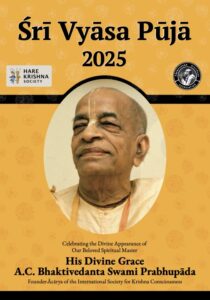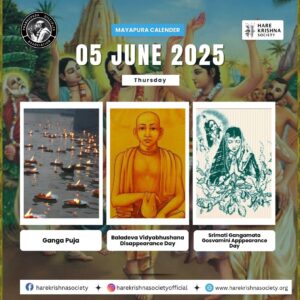By Bhakta Alex

Myth: Srila Prabhupada couldn’t say about himself in the third person “he is guru”, he would say “I am guru”
The most logical explanation is as follows: in this case, “he” is Srila Prabhupada himself, because he is asked in the third person “What is the relationship of THAT PERSON who gives the initiation and…” Satsvarupa didn’t even finish his question, but Srila Prabhupada immediately answered it- also in the third person- he, that person who gives the (real, essential, spiritual) initiation is the guru in this ritvik system.
Ritviks are officiators, the guru is initiator. Although Srila Prabhupada had taught that real initiation is not formal ceremony, but serious acceptance of the spiritual master who imparts transcendental knowledge into the disciple’s heart and takes spiritual charge of him, up to complete spiritual liberation, it seems that Satsvarupa and others who formulated the questions to be asked to Srila Prabhupada didn’t word it quite to this point. Srila Prabhupada answer is he, “that person who gives the initiation”, is guru. But who is that real initiator guru in the ritvik/officiating acarya system that Srila Prabhupada had just promised to establish for the future, particularly when he is no longer with us? It is Srila Prabhupada himself.
Otherwise, if we accept anti-ritviks’ interpretation that here Srila Prabhupada spoke of ritvik, not himself, as the guru, then it’s a sudden U-turn, direct contradiction to the answer he had just given moments earlier, and then we’re anyway left with July 9th directive as the final explanation of the issue.
But the “ritvik” understanding is confirmed by Srila Prabhupada later in this conversation when he is asked in the second person, “So they may be considered your disciples?” He agreed by answering “yes”. It is further confirmed in the July 9th directive:
“The newly initiated devotees are disciples of His Divine Grace A.C. Bhaktivedanta Swami Prabhupada, the above eleven senior devotees acting as His representative.”
The Last Will signed by Srila Prabhupada in June 1977 also says that any future successor to the appointed executive directors for each and every ISKCON property must be “my initiated disciple”.
Finally, there was certainly an aspect of Srila Prabhupada humility: he didn’t like to emphasize “I”, “me”, “mine” too much, but would sometimes (off course, not always) refer to himself in the third person: the guru, spiritual master, he, his, etc., especially while discussing his position as acarya. E.g.:
“Regarding serving your godbrothers, this is a very good practice. The Spiritual Master is never without His followers, so to serve the Spiritual Master also means to be the servant of His disciples. When you want to serve the king, you must also serve his minister, secretary, and everyone who serves him. And to serve his servants may please him more than to serve the king personally. So, the Spiritual Master is not alone. He is always with His entourage.” (SP Letter to: Sivananda — Los Angeles 23rd January 1969)
“Regarding your $2,000 which you promised to send me within three weeks, I beg to thank you for this. Actually, a brahmacari should contribute whatever he has got to Krishna, through the Spiritual Master. The Spiritual Master does not accept anything for his personal use, but he employs everything for Krishna’s service. Therefore, the Spiritual Master is accepted in the renounced order of life.” (SP Letter to: Giriraja — Los Angeles 5th July 1969)
“This spot life is merely a platform for us to make progress toward going back to home, back to Godhead, therefore we should not be too much concerned with family matters. We are never alone in Krsna consciousness; you have got so many wonderful brothers and sisters who are really your family, and besides that the spiritual master is always in his instructions, and Krsna is there within your heart, so you need not feel you are ever alone.” (SP Letter to: Gangadevi — London 11th August 1972)
So, from different angles, the conclusion is that Srila Prabhupada spoke here of himself as the “guru” of future disciples in ISKCON. Ritviks, although providing formal initiation ceremonies, are actually officiators on behalf of Srila Prabhupada, the real initiator guru.
Section 3:
7. Satsvarūpa: But he does it on your behalf.
8. Prabhupāda: Yes. That is formality. Because in my presence one should not become guru, so on my behalf, on my order… Āmāra ājñāya guru hañā [Cc. Madhya 7.128]. Be actually guru, but by my order.
“Although Srila Prabhupada’s answers are quite clear and consistent, it does seem as though there is some confusion in the mind of the questioner at this point. This is where Satsvarupa dasa Goswami asks… “But he does it on your behalf”. The “he” Satsvarupa dasa Goswami is referring to is the ritvik, whereas the “he” that Srila Prabhupada was referring to, as we have shown, could only have been himself, since he is the only initiator within the ritvik system. Despite his disciple’s apparent confusion, Srila Prabhupada deftly adapts his next answer to match Satsvarupa dasa Goswami’s actual concern, namely the status of these future ritviks.” (TFO)
“In point #8, Śrīla Prabhupāda implied that it is not etiquette to become a guru when one’s guru is still physically present. But then, he immediately added that just by his disappearance, the ṛtviks do not automatically become gurus but must wait for his order to be so. “On my order…” It is prudent to note here that Śrīla Prabhupāda is speaking of an order in the future tense. That means this tape cannot be called the “Appointment Tape” as he is not appointing anyone here but pointing to the future.” (IA77)
Myth: Srila Prabhupada quoted the “amara ajnaya” verse which means the order to become diksa gurus had been given to everyone by Lord Caitanya
“It is further argued that the use of the “amara ajnaya” verse at this point means that the order to be diksa guru had already been given, since this order from Lord Caitanya had been repeated many times by Srila Prabhupada. However, the “amara ajnaya” order, as we have seen, refers only to siksa guru; we know that the order to become diksa guru had not yet been given since Srila Prabhupada states: “When I order”. Therefore, Srila Prabhupada’s use of the verse at this point is simply to convey the notion of an order needing to be given before guruship, of whatever type, is taken up.” (TFO)
Srila Prabhupada had used the “amara ajnaya” verse in a similar vein earlier. In May 1976, Srila Prabhupada invited some leading disciples to visit him in Hawaii. He reprimanded them for attempts to become premature gurus, and said these artificial attempts to occupy the post of guru will never be successful. And he stressed that one should achieve high qualification (perfection of devotional service to Lord Krishna, the Supreme Personality of Godhead) and observe etiquette (not proclaim oneself as a guru, but one should receive the order from one’s guru, so that not to repeat the mistake of some Gaudiya Matha leaders).
Prabhupāda: The tendency for becoming guru is there… What is the answer to this, their making some attempt to become guru?. It is an immature attempt. And it is not the thing that by artificial attempt one becomes guru. Guru is accepted by etiquette, not by artificial attempt. Āmāra ājñāya guru hañā [Cc. Madhya 7.128]: “Follow My order and become guru.” Not that you become guru.
āmāra ājñāya guru hañā tāra’ ei deśa
yāre dekha, tāre kaha ‘kṛṣṇa’-upadeśa
[Cc. Madhya 7.128]
Hmm? You have to follow the paramparā system, order. That is guru. Not that I declare myself as guru. No. That is not guru. Guru is he who has strictly followed the order of the spiritual master. He can become guru. Otherwise, it will be spoilt. Artificial attempt is not good… (Room Conversation — May 30th 1976, Honolulu)
Prabhupāda: So-called commentator, teacher of Bhagavad-gītā, he does not come in the disciplic succession. He is self-made guru. Therefore, he’s not guru. Self-made guru cannot be guru. He must be authorized by the bona fide guru. Then he’s guru. This is the fact. Here… Nobody can be self-made anything. A medical practitioner, he cannot become self-made, that “I have studied all the medical books in my home.” No. “Have you ever gone to the medical college and taken instruction from the bona fide teachers?” Then, if you have got the certificate, then you are medical practitioner. Similarly, bona fide guru means he must be authorized by the superior guru. Just like Caitanya Mahāprabhu says, āmāra ājñāya guru hañā tāra’ ei deśa [Cc. Madhya 7.128]. He must receive the order from the superior. And the superior must be bona fide. Then he’s bona fide, not self-made. (The Nectar of Devotion class — Vṛndāvana, October 31st, 1972)
Although Lord Caitanya, in the above verse, spoke of instructing/preaching, not initiating, but the principle of authorization is the same for every type of guru. So, Srila Prabhupada would sometimes quote the “amara ajnaya” verse as a proof that a guru needs to be authorized (by his own guru, by the way, which shows that there had been no Lord Caitanya’s authorization for everyone to become DIKSA guru in the future). So, this is the case with May 28th 1977, conversation: Srila Prabhupada says one needs to get authorization from his guru citing the example of Lord Caitanya.
It’s just extrapolation to claim that Srila Prabhupada actually authorized termination of the ritvik initiation system and emergence of the whole current multiple diksa guru system in maya-ISKCON just by quoting Lord Caitanya’s “āmāra ājñāya guru hañā” verse. Srila Prabhupada doesn’t name a successor or give any direct authorization to any diksa guru. He says “but by MY order”, and later in this conversation “WHEN I order”. So, this is not ordering diksa gurus there and then by Srila Prabhupada or proclaiming that diksa gurus had already been authorized by Lord Caitanya alone. After this conversation no diksa guru has been authorized by Srila Prabhupada either, but ritviks were. So how can anti-ritviks base their ideas on such obviously incorrect interpretations?



